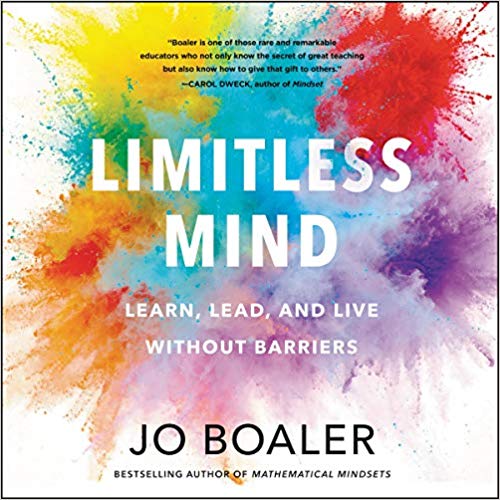
The Limitless Mind
Jo Boaler is a best-selling author, Stanford mathematics professor, brain researcher, and an educator who has the remarkable talent of getting you to think deep to the roots of your teaching pedagogy.
I have read some of Boaler's books before- Mathematical Mindsets & Mindset Mathematics 4th Grade- and have really enjoyed them. When I heard that she wrote a new book I knew I needed to get my hands on it. I wanted to get a book study going this fall, but time was not allowing such things and I changed my plans to read most of the book over our Thanksgiving Break and Winter Break. It was lovely to be able to read them without having to worry about grading paper or lesson planning during that time.
My big take aways-
- Defeat is Optional: my favorite quote from the whole book on page 207. This is my motto for 2020... I can prepare myself for situations and put my best foot forward.
- Brains are in a constant state of growth and change. This was early in the book, but something I keep going back to not only with my own personal children, but myself and the students in my classroom.
- Targeted Brain Practice: Chapter 1 gave some fabulous stories about how people trained themselves with purposeful targeted brain practice to achieve goals. People who are disabled, learning a sequence of numbers, and playing the piano.
- Fact Fluency: Boaler does not believe in speed when it comes to fact fluency. This is throughout her entire book, which aligns with my teaching pedagogy. She gives numerous examples of how teachers identify children with disabilities in mathematics who do not memorize math facts as well as their classmates. Later in her book she describes automaticity vs. understanding. When students have automaticity without understanding they are not thinking flexibly, with number sense, and have a hard time communicating their thinking or reasoning. I could go on about how timed tests produce anxiety in many children and when anxiety is present and their working memory is compromised. When you're recalling facts you're using your working memory and when that is compromised, performance goes down. When can't perform, they have this feeling of "going blank" and the thoughts of, "I'm not good at math start to set in." Boaler is a huge advocate for a multidimensional approach. Having the students solve a given problem in more than one way. Being open to the learning process and being creative with thinking is far more effective than the "shallow, rote memorization techniques used in the past." When students (teachers and parents as well) believe that mathematics is about memorization, they are not developing a conceptual understanding. They are not making connections. They are believing that math is a subject of rules. Of one right way to solve a problem. We are limiting our students when we push memorization vs. flexible thinking.
- Mathematics is about communication and reasoning. Throughout the writing of this book Boaler and her team interviewed over 60 people to talk about their experiences with mathematics. As she was interviewing the CEO of product development of SimCity, who was the director of an online computational data site. He stated that he does not want to hire the best mathematicians. He wants the best mathematicians that can communicate and approach problems in multiple ways.
There are many, many more ways Boaler spoke to me, but my general guide in helping others learn and teach mathematics better is based around how we teach fact fluency and teaching with a multidimensional approach. We need to allow students mathematical freedom to think and encourage them to explain their thinking orally to learn how to better communicate their ideas with others.
We, Kristin and I, will be hosting a book study on The Limitless Mind on our Facebook page (Making Math Make Sense) starting Saturday February 1, 2020. If you haven't read the book, you've got a little over 2 weeks to get it and get started. You DO NOT have to have read the book yet, but you can read as we go. My thoughts are to focus on one chapter a week.
This book study is designed to ask thought provoking questions. We want there to be a respectful discussion where you are challenged in your thinking. Do you agree with other comments or not? Why? We are looking for collaboration and a way where we can help one another strengthen our teaching of mathematics.
If you are interested in earning graduate credit for this book study, please comment and I will get you the information.